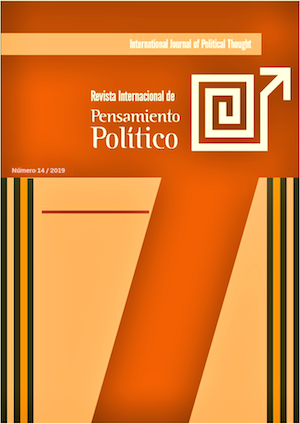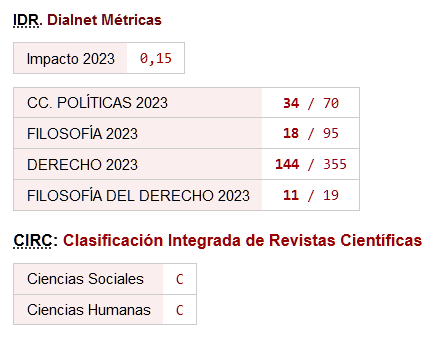Social Rights under the aegis of Amartya Sen's theory of justice
DOI:
https://doi.org/10.46661/revintpensampolit.4774Keywords:
Amartya Sen, Human Rights, Social Rights, Capabilities, Social JusticeAbstract
The aim of this study is to exhibit and discuss social rights under the aegis of Amartya Sen’s theory of justice. The Indian economist’s approach
of capabilities reveals a prospect committed to the progress of human rights obligations and essential to the production of a Social Constitutional State. Focusing on the needs of people beset by deprivation allows us to advance in the investigation of the nature of social rights, as well as in the extent to which they are human and constitutional rights. Relating it to authors such as Martha Nussbaum and Miguel Nogueira de Brito, we study the impact of the positivation of the benefit rights in the Constitutions and we look for an alternative to its concretization by means of a process exclusively of judicialization
judicialization.
Downloads
References
Bonavides, Paulo (2011), Curso de Direito Constitucional, São Paulo: Editora Malheiros.
Brito, Miguel Nogueira de (2013), “Are Social Rights More Like Civil or Political Rights?”, Apresentação na Conferência do Instituto de Ciências Sociais da Universidade de Lisboa de 2013. Disponível em https://www.ulisboa.pt/wp-content/uploads/Programa-Completo-e-Resumos.pdf [14 de maio de 2019].
Brito, Miguel Nogueira de(2014a), “O ordenamento constitucional português e a garantia de um nível mínimo de substistência”, in Antunes, Maria [coord.], Estudos em memória do Conselheiro Artur Maurício, Coimbra: Coimbra Editora.
Brito, Miguel Nogueira de et al (2014b), “Social Rights and the 70th anniversary of the Second Bill of Rights”, in Revista Eletrónica de Direito Público, vol. 1, núm. 3, Lisboa (Dez. 2014). Disponível em: http://www.e-publica.pt/volumes/v1n3a01.html [14 de maio de 2019].
Cohen, Gerald Allan (1993), “Amartya Sen´s unequal world”, in Economic and Political Weekly, vol. 28, núm. 40, Mumbai (Out. 1993).
Novais, Jorge Reis (2017), Direitos sociais: teoria jurídica dos direitos sociais enquanto direitos fundamentais, Lisboa: Editora Associação Académica da Faculdade de Direito da Universidade de Lisboa.
Nussbaum, Martha (2006), Frontiers of Justice: Disability, Nationality, Species Membership, Cambridge: Belknap Press.
Pansieri, Flávio (2016), “A crítica de Amartya Sen à concepção rawlsiana de justiça”, in Revista Sequência – Estudos Jurídicos e Políticos, vol. 37, núm. 74, Florianópolis (Dez. 2016).
Rawls, John (1993), Uma Teoria da Justiça, traduzido por Carlos Pinto Correia, Lisboa: Editora Fundamentos. Editora Martins Fontes.
Ferrajoli, Luigi (2015), A democracia através dos Direitos, traduzido por Dias, Jefferson Aparecido et al., São Paulo: Revista dos Tribunais.
Herrera, Joaquín (2009), A reinvenção dos direitos humanos, traduzido por Sousa, Alexandre Araujo de et al., Florianópolis: Fundação Boiteux.
Kelsen, Hans (1945), General Theory of Restatment, Erin Kelly [coord], Cambridge: Harvard University Press.
Sarlet, Ingo (2007), A Eficácia dos Direitos Fundamentais, Porto Alegre: Editora Livraria do Advogado.
Sen, Amartya (2000), Desenvolvimento como Liberdade, traduzido por Motta, Laura Teixeira, São Paulo: Editora Companhia das Letras.
Sen, Amartya (2011), Creating Capabilities: The Humam Development Approach, Cambridge: Belknap Press.
Marin, Solange Regina e Quintana, André Marzulo (2012), “Amartya Sen e a escolha social: uma extensão da teoria da justiça de John Rawls?”, in Revista de Economia Contemporânea, vol. 16, núm. 3, Rio de Janeiro (Set./Dez. 2012).
Neves, Marcelo (2011), Constitucionalização Simbólica, São Paulo: Editora Martins Fontes.
Downloads
Published
How to Cite
Issue
Section
License
Copyright (c) 2020 Creative Commons 4.0 Internacional

This work is licensed under a Creative Commons Attribution-NonCommercial-ShareAlike 4.0 International License.
Open access policy
Free and open access is allowed to any interested party to all the contents of the journal issues, free of charge, being able to print and transfer all the articles, with the only condition of specifying the source and authorship.
The journal: a) does not charge authorship costs for the processing of articles or for their submission, b) maintains copyright for authors without restrictions, c) facilitates authors to keep their publication rights without limitations.
The International Journal of Political Thought is an original work of the Laboratory of Political Ideas and Practices of the Pablo de Olavide University. All articles included in the Journal are original work of their respective authors. This Journal is freely offered to the scientific and academic community at no cost and releases the contents according to the license "Attribution-NonCommercial-ShareAlike 4.0 CC BY-NC-SA" of the Creative Commons project available in the following url: https://creativecommons.org/licenses/by-nc-sa/4.0/legalcode
If you wish to translate or compile any of the articles available here, please contact us at contacto












 ISSN: 1885-589X
ISSN: 1885-589X  Universidad Pablo de Olavide
Universidad Pablo de Olavide